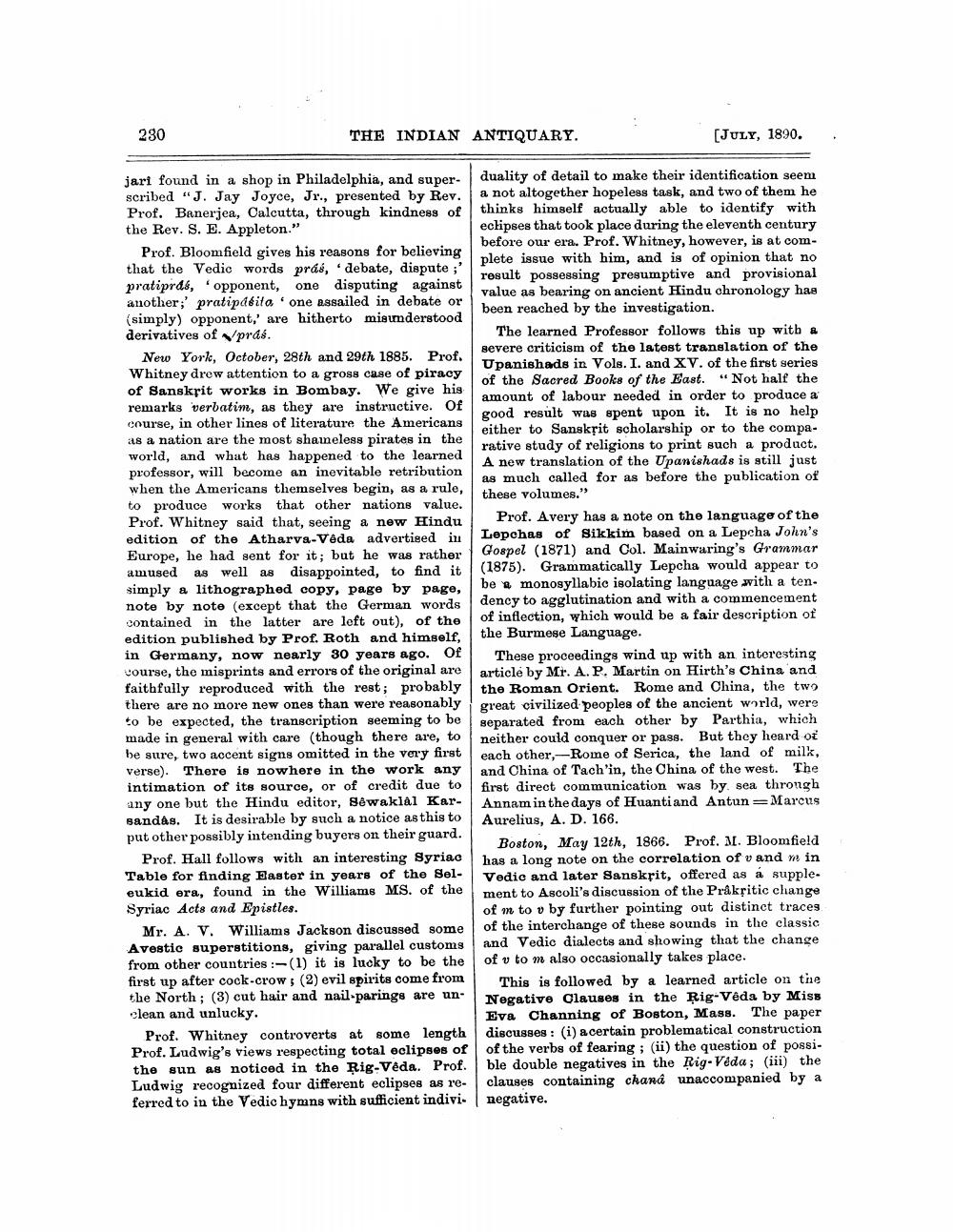________________
230
THE INDIAN ANTIQUARY.
jari found in a shop in Philadelphia, and superscribed "J. Jay Joyce, Jr., presented by Rev. Prof. Banerjea, Calcutta, through kindness of the Rev. S. E. Appleton."
Prof. Bloomfield gives his reasons for believing that the Vedic words prás, debate, dispute;' pratiprás, opponent, one disputing against another;' pratipáéita one assailed in debate or (simply) opponent,' are hitherto misunderstood derivatives of /prás.
New York, October, 28th and 29th 1885. Prof. Whitney drew attention to a gross case of piracy of Sanskrit works in Bombay. We give his remarks verbatim, as they are instructive. Of course, in other lines of literature the Americans as a nation are the most shameless pirates in the world, and what has happened to the learned professor, will become an inevitable retribution when the Americans themselves begin, as a rule, to produce works that other nations value. Prof. Whitney said that, seeing a new Hindu edition of the Atharva-Véda advertised in Europe, he had sent for it; but he was rather amused as well as disappointed, to find it simply a lithographed copy, page by page, note by note (except that the German words contained in the latter are left out), of the edition published by Prof. Roth and himself, in Germany, now nearly 30 years ago. Of course, the misprints and errors of the original are faithfully reproduced with the rest; probably there are no more new ones than were reasonably to be expected, the transcription seeming to be made in general with care (though there are, to be sure, two accent signs omitted in the very first verse). There is nowhere in the work any intimation of its source, or of credit due to any one but the Hindu editor, Sêwaklâl Karsandas. It is desirable by such a notice as this to put other possibly intending buyers on their guard.
Prof. Hall follows with an interesting Syriac Table for finding Easter in years of the Seleukid era, found in the Williams MS. of the Syriac Acts and Epistles.
Mr. A. V. Williams Jackson discussed some Avestic superstitions, giving parallel customs from other countries:-(1) it is lucky to be the first up after cock-crow; (2) evil spirits come from the North; (3) cut hair and nail-parings are unclean and unlucky.
Prof. Whitney controverts at some length Prof. Ludwig's views respecting total eclipses of the sun as noticed in the Rig-Vêda. Prof. Ludwig recognized four different eclipses as referred to in the Vedic hymns with sufficient indivi
[JULY, 1890.
duality of detail to make their identification seem a not altogether hopeless task, and two of them he thinks himself actually able to identify with eclipses that took place during the eleventh century before our era. Prof. Whitney, however, is at complete issue with him, and is of opinion that no result possessing presumptive and provisional value as bearing on ancient Hindu chronology has been reached by the investigation.
The learned Professor follows this up with a severe criticism of the latest translation of the Upanishads in Vols. I. and XV. of the first series of the Sacred Books of the East. "Not half the amount of labour needed in order to produce a good result was spent upon it. It is no help
either to Sanskrit scholarship or to the comparative study of religions to print such a product. A new translation of the Upanishads is still just as much called for as before the publication of these volumes."
Prof. Avery has a note on the language of the Lepchas of Sikkim based on a Lepcha John's Gospel (1871) and Col. Mainwaring's Grammar (1875). Grammatically Lepcha would appear to be a monosyllabic isolating language with a tendency to agglutination and with a commencement of inflection, which would be a fair description of the Burmese Language.
These proceedings wind up with an interesting article by Mr. A. P. Martin on Hirth's China and the Roman Orient. Rome and China, the two great civilized peoples of the ancient world, were separated from each other by Parthia, which neither could conquer or pass. But they heard of each other, Rome of Serica, the land of milk, and China of Tach'in, the China of the west. The first direct communication was by sea through Annam in the days of Huanti and Antun Marcus Aurelius, A. D. 166.
=
Boston, May 12th, 1866. Prof. M. Bloomfield has a long note on the correlation of v and m in Vedic and later Sanskrit, offered as a supplement to Ascoli's discussion of the Prakritic change of m to v by further pointing out distinct traces. of the interchange of these sounds in the classic and Vedic dialects and showing that the change of v to m also occasionally takes place.
This is followed by a learned article on the Negative Clauses in the Rig-Vêda by Miss Eva Channing of Boston, Mass. The paper discusses: (i) a certain problematical construction of the verbs of fearing; (ii) the question of possible double negatives in the Rig-Vêda; (iii) the clauses containing chanâ unaccompanied by a negative.




